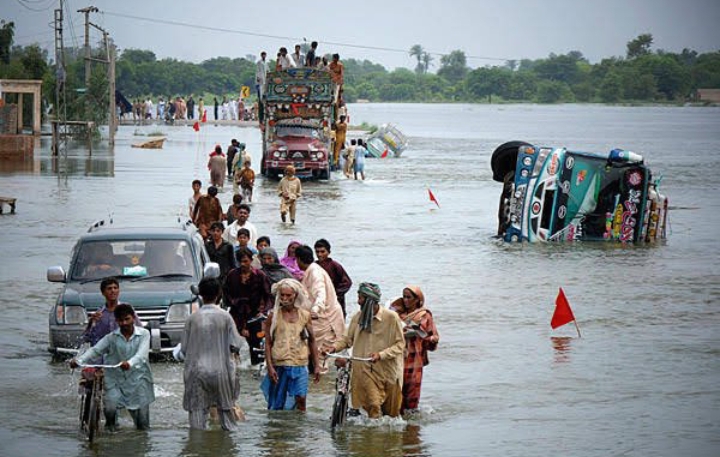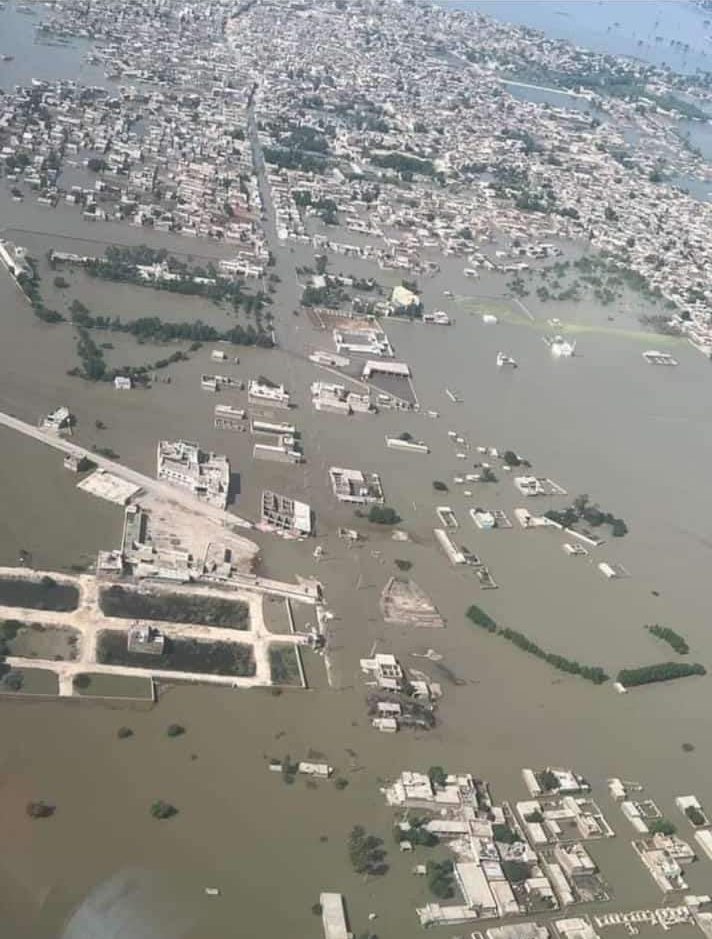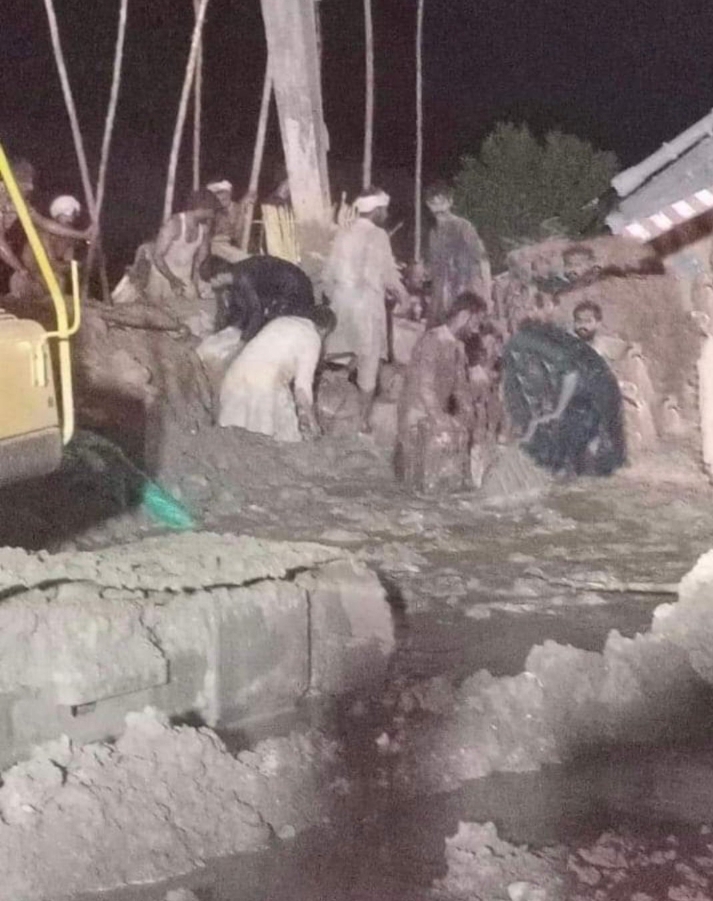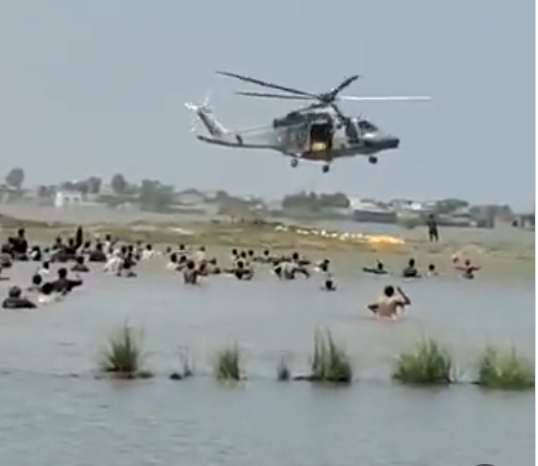
The country lacks mechanism, capacity, and capital needed to navigate the populace from jaws of floods unleashed by monsoon.
Nazeer Ahmed Arijo
Torrential rains and subsequent flash floods and the breaching of dams and embankments have brought disaster of biblical proportions in urban in general and rural areas of Pakistan in particular. Imagine the scale of death and destruction caused by destructive spells of rain throughout the country, recently revealed by both national and international media outlets: 10 million people are displaced; the death toll has risen to over 1300 of which over 35 percent – 453 are children. Over two hundred bridges have collapsed and around 40 dams breached. The number of flood-hit people is as high as 33 million.
Besides, 80 percent of standing crops is said to have been destroyed. The scale of destruction of infrastructure and human casualties could be much bigger as the actual damage bill and human loss could not be ascertained right now.
 Political callousness
Political callousness
It is disappointing to note that some political characters claiming to be political messiahs were sowing the seeds of mistrust by calling on the population not to give donations to the government on customary charges of corruption and financial misappropriation. Such shameless characters were named and shamed by a cross sections of the society. After having received a robust reaction from the public over this behavior, the shallow-hearted decided to host telethon to collect donations for the rain victims. Calling the present government of ‘thieves and looters’, the organized social media campaign was launched by some unscrupulous individuals asking all and sundry not to give funds to the government. In crises like the present, political leaders all over the world unite the nation. But, in our part of the world, petty political games undermine the noble cause of standing in solidarity with the public. This political pandemic called polarization in times of catastrophic conditions unleashed by climate change is extremely upsetting. However, the damage was done. Once mistrust is cultivated, it is very difficult to wipe it out.
Humanitarian assistance from abroad
While the callousness of some national political leaders was hurting rain victims, the International Response on the back of biblical catastrophe was encouraging.
Foreign Minister Bilawal Bhutto Zardari’s appeal has generated about one trillion 30 billion rupees from the United Nations member countries. Earlier, the UK and the European Union pledged to provide up to £1.5., and €350,000 (nearly PKR 76 million) respectively to provide crucial humanitarian assistance.
Also, the Kingdom of Saudi Arabia, UAE, Turkey, and China have dispatched ration bags, shelter material, and medicines to scale up immediate relief.
OIC Secretary Hussain Ibrahim appealed to the member states to help Pakistan on an emergency basis. Canadian PM Justin Trudeau expressed solidarity with Pakistan and pledged to continue to help the rain affectees through NCRF and Red Cross. President of France Emmanuel Macron said he was saddened to hear about the loss of lives and destruction caused by historic floods in Pakistan, and showed his willingness to assist Pakistan to come out of the current crisis.
 Exploitation all around
Exploitation all around
Under such turbulent times, exploiters opened their wings to fleece the public already experiencing troubled times. Heavy rain on the one hand, destroyed mud-houses and huts, and on the other caused cracks in the roofs made of backed bricks ultimately dripping. With roofs dripping, the poor needed to cover those roofs with plastic to save from the seepage; realizing the demand for plastic, the shopkeepers hiked the price of the item in question – routinely it was being sold at Rs.40 per meter, but after the surge in demand, it was sold at Rs.200 to 300 per meter. Under such circumstances, the price of plastic Tarpaulin skyrocketed, too. On the heels of humanitarian crises, the government decided to disburse BISP cash of Rs.2500O among the beneficiaries; in Sindh unscrupulous individuals distributing this cash, started deducting Rs.2000 to 3000. This financial fraud has hit headlines in provincial newspapers.
It tells a tale of the historical exploitation of the vulnerable sections and the failure of the state authorities to clip the wings of predators.
Back-breaking inflation
The prices of vegetables on the heels of torrential rains were hiked suggesting the usual hoarding and black-marketing in times of natural calamity. Before rain emergency, the potatoes and onions were being sold at Rs.40 and 80 respectively. After rain emergency, the two items are being sold at Rs.80 and 200 to 300 respectively- not to mention tomato, which has become a luxury item in flood situation .This August inflation rose to staggering 27.26 percent, which was the second highest figure recorded in the country’s history after 1973-74.The point to be noted is that the public were already facing tsunami of inflation following Russia–Ukraine war that had fuelled price of cooking oil and other edible items. Given rising inflation, the International Monetary Fund (IMF) has warned of protests and instability in Pakistan. The warning given by the Fund carries weight as the already burdened ordinary are burdened with prices of food items that have spiked at breakneck speed.
Cut to the quick
Twitters spaces are being hosted to highlight the horrors of ongoing natural calamity by various individuals. I have been actively participating and giving my input on topics ranging from public donations to relief, rescue, and rehabilitation. Recently I was cut to the quick after having listened to a certain speaker. A lady expressed that a financial package of Rs.25000 announced by the government for the rain-affected people was a lottery. When it was my turn to speak, I expressed my utter displeasure over such remarks devoid of ground realities. A person, who has lost his home, standing crops, and livestock following the outbreak of animal disease, how was it that the meager amount of Rs.25000 was a lottery for him?
Food crises loom large
It is said that aftershocks of volcanoes are more destructive. Likewise, the unfolding current crises emanating from recent rain emergency, paints the same picture.
According to Development and Planning Minister Ahsan Iqbal, half of the country’s cotton crop has been washed away and vegetables, fruit, and rice fields have sustainable significant damage. This will usher in food shortages ultimately compelling the incumbent government to give a go-ahead for the import of grains, vegetables and fruits, etc. It will increase our import bill and subsequently negatively impact the already fragile economy. Federal Finance Miftah Ismail recently remarked that “government can consider importing vegetables, other edible items from India to facilitate people after the destruction of standing crops in Pakistan.
 Let us not forget that Sindh and Balochistan – which were already facing a food crisis, are the worst victims of recent rains and floods. Dawn editorial “Disaster and Diet (30 August) reads that “According to the IPC Acute Food Insecurity Analysis, 2021-2022, due to the increasing intensity and length of recurring heatwaves in the region, high food and fuel prices, disease outbreak and pandemic shocks. The report described both provinces as having a “high prevalence of food insecurity, malnutrition, and poverty” while calling for “urgent action” by the relevant stakeholders”. The World Health Organization (WHO) has convincingly conveyed its concern saying that “The current flood situation will highly likely increase the spread of disease, especially if and when response capacities are hindered”. Medical experts rang alarm bell having declared that around 5 million feared to be sick due to disease outbreak in next twelve weeks in flooded areas. They are likely to be infected with diarrhea, cholera, gastroenteritis, typhoid, dengue and malaria; outbreak would require Rs.1 billion in supplies. To save the flood-hit people from viral infections, situation calls for concrete efforts in terms of ensuring clean drinking water and hygienic living conditions. According to figures made available by United Nations Population Fund (UNFPA), more than half a million pregnant women are flood-hit and in dire need of medical supplements and dietary care. WHO Pakistan pointed out that damages have occurred to over 1640 health facilities and installations across the country of which 432 were fully damaged. This will hinder medical relief needed in flood environment.
Let us not forget that Sindh and Balochistan – which were already facing a food crisis, are the worst victims of recent rains and floods. Dawn editorial “Disaster and Diet (30 August) reads that “According to the IPC Acute Food Insecurity Analysis, 2021-2022, due to the increasing intensity and length of recurring heatwaves in the region, high food and fuel prices, disease outbreak and pandemic shocks. The report described both provinces as having a “high prevalence of food insecurity, malnutrition, and poverty” while calling for “urgent action” by the relevant stakeholders”. The World Health Organization (WHO) has convincingly conveyed its concern saying that “The current flood situation will highly likely increase the spread of disease, especially if and when response capacities are hindered”. Medical experts rang alarm bell having declared that around 5 million feared to be sick due to disease outbreak in next twelve weeks in flooded areas. They are likely to be infected with diarrhea, cholera, gastroenteritis, typhoid, dengue and malaria; outbreak would require Rs.1 billion in supplies. To save the flood-hit people from viral infections, situation calls for concrete efforts in terms of ensuring clean drinking water and hygienic living conditions. According to figures made available by United Nations Population Fund (UNFPA), more than half a million pregnant women are flood-hit and in dire need of medical supplements and dietary care. WHO Pakistan pointed out that damages have occurred to over 1640 health facilities and installations across the country of which 432 were fully damaged. This will hinder medical relief needed in flood environment.
The current academic year is in jeopardy
The rain affected people have taken shelter in government schools and colleges. It, thus, will negatively impact the current academic year of the learners. It is unlikely that those who have taken shelter in public sector schools and colleges will vacate until they are offered alternatives- accommodation. Given the magnitude of displacement and scanty resources of the government, rehabilitation of those rain victims seems beyond the reach of the state. Worryingly, the displaced and those who migrated to urban areas will find it difficult to educate their children following financial constraints emanating from loss of livelihood. The possibility of some children becoming breadwinners cannot be ruled out. Some others might fall prey to professional beggar groups. Moral decay can be gauged from that a Hindu girl was recently gang-raped in Sindh’s District Sanghar after being promised relief goods.
 The 2010 flood brought in wake cruel activity of coaxing small angels into beggary by the criminals in question. It is to be kept in mind that education received severe setbacks for two years following covidised environment and subsequent closure of educational institutions in the country. And, it has to be kept in mind that when students attend their classes throughout the year, their leaning outcomes have been deeply disappointing due to plethora of problems known to everyone. The closure of educational institutions compromise the already compromised standard of education. Save the Children, a UK- based organization in its recent report revealed that over 18,500 educational institutes have sustained partial damage or have been completely destroyed due to abnormal monsoon rainfall. The organization’s Country Director for Pakistan, Khuram Gondal said, “The scale of damage we are seeing will prevent thousands of children from going back to school any time soon. We have seen entire buildings completely washed away. Children already battling the shock and horror of what is happening around them, now also have to cope with loss of their classrooms and their safe place to learn. We know from experience that it takes time to repair schools, and many of these children have already missed months of education already because of COVID-19.We are calling donors around the world to recognize the entire terrible situation in Pakistan and gig deep to help children. Beyond immediate life-saving supplies like shelters, food, and water, we also need to establish emergency schools where children can go, be safe, and learn. Schools are vital for both children’s future and their current well-being”.
The 2010 flood brought in wake cruel activity of coaxing small angels into beggary by the criminals in question. It is to be kept in mind that education received severe setbacks for two years following covidised environment and subsequent closure of educational institutions in the country. And, it has to be kept in mind that when students attend their classes throughout the year, their leaning outcomes have been deeply disappointing due to plethora of problems known to everyone. The closure of educational institutions compromise the already compromised standard of education. Save the Children, a UK- based organization in its recent report revealed that over 18,500 educational institutes have sustained partial damage or have been completely destroyed due to abnormal monsoon rainfall. The organization’s Country Director for Pakistan, Khuram Gondal said, “The scale of damage we are seeing will prevent thousands of children from going back to school any time soon. We have seen entire buildings completely washed away. Children already battling the shock and horror of what is happening around them, now also have to cope with loss of their classrooms and their safe place to learn. We know from experience that it takes time to repair schools, and many of these children have already missed months of education already because of COVID-19.We are calling donors around the world to recognize the entire terrible situation in Pakistan and gig deep to help children. Beyond immediate life-saving supplies like shelters, food, and water, we also need to establish emergency schools where children can go, be safe, and learn. Schools are vital for both children’s future and their current well-being”.
Passing the buck
Political pattern cultivated over the years by the governments -both past and present and the clergy class -is blaming Nature’s fury, and sins committed culminating in catastrophe respectively. The present government has been feeding the population that climate change triggered heavy rains as a result of which the country saw a crisis of unimaginable proportions. However, what will the federal and provincial governments say about their failure to minimize the damages by prioritizing foolproof measures to warn the population and evacuate the same? What will the governments-federal and provincial say about their imprudent steps of allowing infrastructures that have blocked waterways and routes of flooding water? What will the governments say about poor- house planning? What will the governments say about encroachment upon banks of rivers and drains? What will they say about choked drains? And last but not the least, what will ruling elites say about their failure to devolve National Disaster Management Authority into (NDMA), Provincial Disaster Management Authority (PDMA) and District Disaster Management Authority (DDMA)?
The Met office had predicted torrential rains much earlier. Why were the dams not emptied when there was an acute shortage of water for agricultural purposes? What have the successive governments done to contain climate crises in the country? These questions demand answers.
And some religious leaders have attributed the death and destruction caused by natural calamity to sins committed by people. Who lost lives, homes, livestock, and livelihoods? It is the ordinary who have been hit hard. Are the ordinary only sinners?
What will the religious leaders say about political sins, and managerial and institutional sins committed by successive ruling elites ultimately failing to undermine the fury of floods and ravages of rains? What the ruling and religious elites need to realize is that the world is using scientific methods to make it rain where it is needed; we are far behind when it comes to using technology and modern methods.
“Cloud seeding is a scientific process that improves a cloud’s ability to make rain or snow, as well as control other weather events. The technique, which experts also call weather modification, can help in areas that don’t have a big enough supply of natural water. After cloud seeding, precipitation (rain or snow) will fall from the clouds onto the ground”. Flood relief fails reach remote areas. The reasons being both the state lacks mechanism and material resources to reach those areas. And the concentration of NGOs is limited to cities and towns. As a result, rain-flood afectees in far flung areas are waiting for messiahs who could rescue them and offer shelter materials and food. Even those living in tents and relief camps have been complaining of inadequate food delivery. Blame must be put at the door of those who have successively prioritized a political structure that feeds and facilitates the minority leaving the vast majority to fend for themselves. Because of unequal distribution of wealth, today the poor are getting poorer, and the rich richer. The former are living in slums, that too, in vulnerable areas, and the latter are living in protected and posh areas of the country.
An obvious issue no one is talking about is our failure to adapt and poor housing planning, and to top it all, no lesson learning from previous disasters. This failure has exacerbated crises that we are presently grappling with. Nations in other parts of the world learn and move forward planning and implementing policies to mitigate calamities. Heart-rending images of people stranded have appeared on social media networking sites. Climate change and development expert, Ali Shaikh is of the opinion that what we see today is just a trailer of what is in store for us-poverty, hunger, malnutrition and disease if we don’t pay heed to climate change. Climate refuges are coping with crises –hopelessness, hunger diseases, and psychological trauma triggered by the terrible monsoon rainfall.
To move forward, Pakistan needs climate resilience – pre-disaster planning rather than post-disaster management. Because, the country lacks mechanism, capacity, and capital needed to navigate the populace from jaws of floods unleashed by monsoon. The present “monsoon rains on steroids” have left us hardly with dry land to pump the water out. If early warnings of climate change fell on deaf ears, the next one could be crueler.
________________
 Nazeer Ahmed Arijo is a freelance contributor. nazeerarijo@gmail.com
Nazeer Ahmed Arijo is a freelance contributor. nazeerarijo@gmail.com